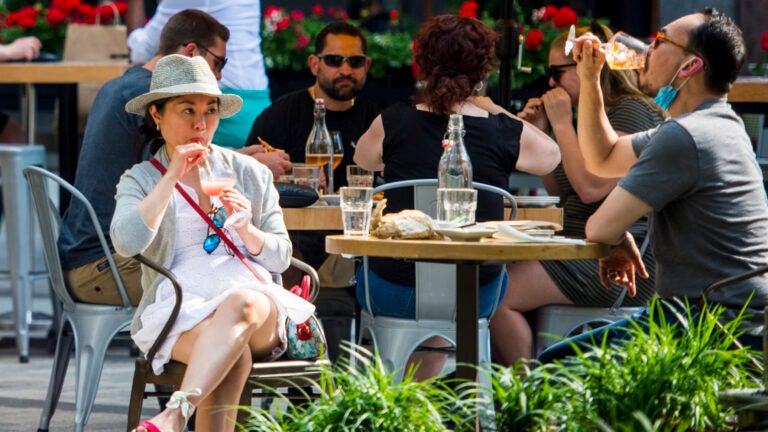Massachusetts lawmakers are eyeing a repeal of the state’s happy hour ban. Charlie Baker isn’t so sure.
"I'd be hard pressed to support changing it."

Call him a “stick in the mud,” but Gov. Charlie Baker says he’s not on board with the sudden energy around repealing the ban on happy hours in Massachusetts.
A recent survey by MassInc Polling Group found that 70 percent of Bay Staters support allowing bars and restaurants to offer drinks discounts during happy hour, with just 20 percent of residents opposed. And state Rep. Mike Connolly, a Cambridge Democrat, announced Wednesday that a bill he introduced this session would “bring stakeholders together to revisit” the ban as part of a raft of restaurant relief measures in the wake of the COVID-19 pandemic.
However, Baker said Thursday that he’s skeptical of the movement, citing concerns that happy hours could result in a resurgence in drunk driving.
“I get the fact that, for most people, they are probably just an opportunity to spend time and enjoy it with friends,” Baker said. “But that law came about as a result of some really awful things that happened over a sustained period of time. I’d be hard pressed to support changing it.”
Massachusetts banned happy hours amid a national campaign against drunk driving in the 1980s, as well as after a string a local tragedies that involved drivers who had been over-served during happy hours.
Many states were passing laws to restrict alcohol sales and raise the drinking age at the time — but Massachusetts went further.
Under the 1984 law signed by then-Gov. Michael Dukakis, bars and restaurants became prohibited from offering free or discounted alcoholic drinks, selling unlimited drinks for a fixed price, or sponsoring games or contests that award drinks as prizes.
“I remember what was going on the roads in Massachusetts when we had happy hours,” Baker said Thursday. “There were some awful, horrible, terrible experiences on a very regular basis that came with happy hours back in the day, and I know that probably makes me a stick in the mud to say such a thing, but I would start as a skeptic of going back to the way we ran happy hours once upon a time.”
“I know the folks at Mothers Against Drunk Driving would be with me on that one,” Baker said, referring to the anti-drunk driving group that backed the state’s law to ban happy hours in 1984.
However, it’s not clear if MADD is, in fact, with Baker on this one.
Bob Garguilo, the executive of the groups’s New England chapter, told Boston.com that MADD does not have an official stance on lifting the ban, especially with the prevalence of ride-sharing companies like Uber and Lyft.
“MADD isn’t against the consumption of alcohol by those 21 and over,” the group said in a statement. “It’s simply if you drink, don’t drive. It’s about making the right choice, planning ahead if your plans include alcohol and using a rideshare or having a designated driver.”
Both the Centers for Disease Control and Prevention and the National Highway Traffic Safety Administration point to strict enforcement of drunk driving laws for reducing drunk driving deaths since the 1980s. Neither mention happy hours.
Massachusetts lawmakers previously debated repealing the ban in 2011. Supporters said the move would provide equal treatment to bars and restaurants after the state passed a law to permit casinos and allow them to give free drinks to patrons. Of course, the effort ultimately collapsed.
Connolly said he expects his bill to get a hearing this session “likely in the fall.”
Along with extending pandemic-induced temporary rules that expanded outdoor dining, allowed to-go cocktails, and limited delivery fees for third-party apps such as GrubHub and DoorDash, the state representative says the legislation would create a commission to bring stakeholders like MADD, restaurant owners, and Main Streets organizations to discuss the happy hour ban.
The bill is cosponsored by state Reps. Michelle DuBois and Marcos Devers.
House Speaker Ron Mariano, a fellow Democrat, told Bloomberg Radio on Thursday that he is “committed to taking a look” at Connolly’s bill, even if he does not yet “support it totally.”
“There has to be a balance between what aid you give to bars and restaurants and the public safety issue that is a real concern for many people, but it is worth giving it thought,” Mariano said, according to the State House News Service.
Connolly contends that there have been some major changes since the 1980s. While the rise of Uber and Lyft could potentially assuage some of the safety concerns, the rise of remote work might mean that incentives are necessary to get customers to venture out for drinks in the early evening.
“As a result of the pandemic, many employers are choosing to continue with work-from-home policies — and this threatens to disrupt business patterns for our restaurants and bars — so one of the elements to this proposal is seeking to help compensate for that loss of business,” Connolly said in an email Thursday.
A handful of other states currently have laws that effectively ban happy hour. However, Illinois repealed their ban in 2015, allowing happy hours to return with some guardrails. Connolly hopes to look to them as a potential guide.
“Given the feedback we’ve received so far, it seems like Massachusetts residents are interested in exploring this issue,” he added.